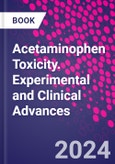Acetaminophen Toxicity: Experimental and Clinical Advances provides detailed information on the risks of consuming the drug in various situations and effective treatments of toxicity.
Divided into two parts, the foundational aspects of this book cover the mechanism of toxicity in a detailed manner beginning with the history of acetaminophen to newly explored areas of genetics, proteomics, and metabolomics. The second half goes on to discuss clinical practices and examine where further research and therapeutic approaches may be headed. This part answers key questions about whom to treat, what are the exceptions, how long do you treat, how much antidote do you need, when are other treatments necessary, and what are those other treatments.
With contributions from experts in the field, this book is a thorough, well-researched, and valuable reference for scientists, researchers, and clinicians engaged in pursuing better and more accurate diagnosis and treatment of patients with acetaminophen toxicity.
Please Note: This is an On Demand product, delivery may take up to 11 working days after payment has been received.
Table of Contents
PART I: Foundational Aspects
1. History of Acetaminophen
2. Intracellular Signaling Mechanisms of Cell Death.
3. Hepatic MAP kinase signaling pathways in APAP-induced cell death
4. Adaptive Mechanisms modulating APAP-induced Cell Death
5. Mode of Cell Death
6. Inflammation
7. Hepatic Regeneration
8. Translation of Acetaminophen Hepatotoxicity Mechanisms from Models to Humans
9. Renal Toxicity
10. Genomics, Proteomics and Metabolomics
Part II: Clinical and Therapeutic
11. Pharmacokinetics and pharmacodynamics
the absorption, distribution, metabolism and excretion of acetaminophen orally and intravenously
12. Minimally Invasive Clinical Biomarkers for use in Acetaminophen Hepatotoxicity
13. Adducts
14. The Rumack-Matthew Nomogram: Development, evolution, and use
15. Pathophysiology of Acetaminophen Overdose
16. Kings College Criteria and Liver Transplantation
17. Sustained-Release Acetaminophen
18. Acetaminophen, Ethanol and other Co-Ingestions
19. N-Acetylcysteine (NAC)
20. Fomepizole
21. Pre-Hospital, Poison Center and Initial Hospital Care of Overdose and Potential Overdosed Patients
22. Epidemiology NPDS (Poison Center Data) CDC and Other Databases
23. Acetaminophen safety in chronic liver diseases
Authors
Barry Rumack Professor Emeritus of Pediatrics and Emergency Medicine, University of Colorado School of Medicine, USA.Dr. Barry H. Rumack, MD, is currently Professor Emeritus of Pediatrics and Emergency Medicine at the University of Colorado School of Medicine and Director Emeritus of the Rocky Mountain Poison Center of the Denver Department of Health and Hospitals. His research interests include acetaminophen overdose and general medical toxicology. He has published over 250 peer-reviewed articles, authored, or edited numerous books and book chapters. He is or has previously been on the editorial board of a number of journals including Clinical Toxicology and Emergency Medicine, among others. He is a Fellow of the American Academy of Clinical Toxicology, American College of Medical Toxicology, and American Academy of Pediatrics and is or has been a member of Society of Toxicology, American Association of Poison Control Centers, and American College of Emergency Medicine.
Hartmut Jaeschke University Distinguished Professor, Pharmacology, Toxicology and Therapeutics; Department Chair, SOM-Kansas City, Pharmacology, Toxicology and Therapeutics, USA.Dr. Hartmut Jaeschke, PhD, is the University Distinguished Professor and Chairman of the Department of Pharmacology, Toxicology, and Therapeutics at the University of Kansas Medical Center, Kansas City, Kansas. He joined KUMC in 2006. He is a Fellow of the Academy of
Toxicological Sciences and Fellow of the American Association for the Study of Liver Diseases. He has published more than 470 peer-reviewed manuscripts, invited reviews, and book chapters in the areas of liver toxicology and liver pathophysiology. He currently serves as an Associate
Editor for Toxicological Sciences, the inaugural Editor-in-Chief of Livers (since 2020), and is a member of 14 editorial boards. In 2019, he was the recipient of the Translational Impact Award from the Society of Toxicology. His major research interests include basic mechanisms and translational aspects of xenobiotic-induced hepatotoxicity and tissue repair with a focus on acetaminophen overdose and mechanisms of inflammatory liver injury in animal models and humans.
Mitchell McGill Assistant Professor, University of Arkansas for Medical Sciences, USA.Dr. Mitchell R. McGill, PhD, is currently an Associate Professor at the University of Arkansas for Medical Sciences. His primary research interests are 1) fundamental and clinical aspects of acetaminophen toxicity, 2) biomarkers of liver injury for clinical and regulatory applications, and 3) fundamental biological mechanisms of liver repair. He has published more than 100 peer-reviewed articles and has contributed chapters to more than a dozen textbooks. He is also a practicing, board-certified clinical chemist. Outside the university, he is a member of the Hepatotoxicity Working Group of the Critical Path Institute, VP-Elect of the Clinical and Translational Specialty Section of the Society of Toxicology, and serves on the editorial boards of several journals. Finally, he is an active member of the Society of Toxicology, the American Association for the Study of Liver Diseases, and the Association for Diagnostics and Laboratory Medicine.








